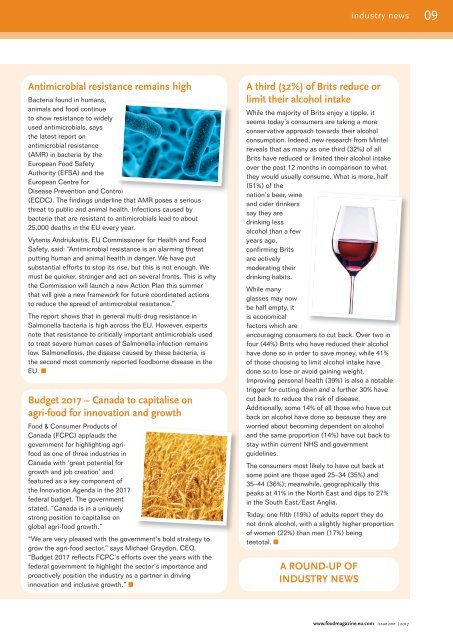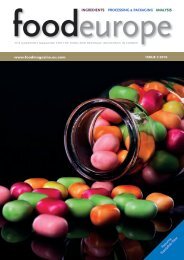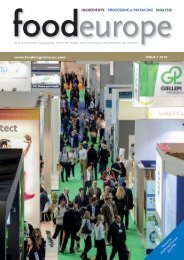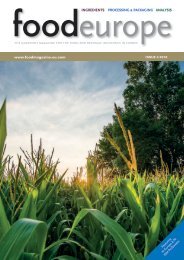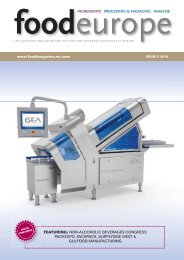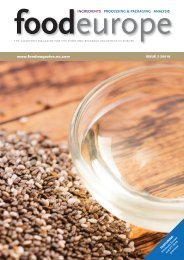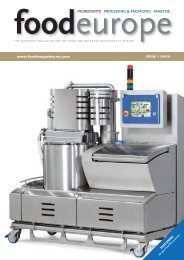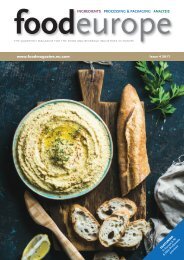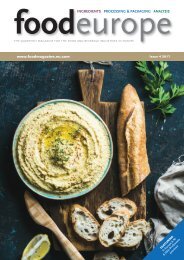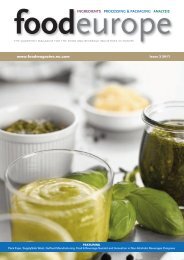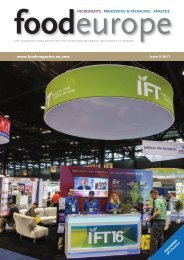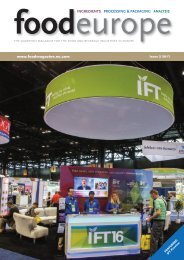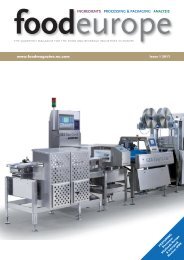issue 1 2017
Issue 1 2017 of FoodEurope Magazine
Issue 1 2017 of FoodEurope Magazine
You also want an ePaper? Increase the reach of your titles
YUMPU automatically turns print PDFs into web optimized ePapers that Google loves.
industry news<br />
09<br />
Antimicrobial resistance remains high<br />
Bacteria found in humans,<br />
animals and food continue<br />
to show resistance to widely<br />
used antimicrobials, says<br />
the latest report on<br />
antimicrobial resistance<br />
(AMR) in bacteria by the<br />
European Food Safety<br />
Authority (EFSA) and the<br />
European Centre for<br />
Disease Prevention and Control<br />
(ECDC). The findings underline that AMR poses a serious<br />
threat to public and animal health. Infections caused by<br />
bacteria that are resistant to antimicrobials lead to about<br />
25,000 deaths in the EU every year.<br />
Vytenis Andriukaitis, EU Commissioner for Health and Food<br />
Safety, said: “Antimicrobial resistance is an alarming threat<br />
putting human and animal health in danger. We have put<br />
substantial efforts to stop its rise, but this is not enough. We<br />
must be quicker, stronger and act on several fronts. This is why<br />
the Commission will launch a new Action Plan this summer<br />
that will give a new framework for future coordinated actions<br />
to reduce the spread of antimicrobial resistance.”<br />
The report shows that in general multi-drug resistance in<br />
Salmonella bacteria is high across the EU. However, experts<br />
note that resistance to critically important antimicrobials used<br />
to treat severe human cases of Salmonella infection remains<br />
low. Salmonellosis, the disease caused by these bacteria, is<br />
the second most commonly reported foodborne disease in the<br />
EU. n<br />
Budget <strong>2017</strong> – Canada to capitalise on<br />
agri-food for innovation and growth<br />
Food & Consumer Products of<br />
Canada (FCPC) applauds the<br />
government for highlighting agrifood<br />
as one of three industries in<br />
Canada with ‘great potential for<br />
growth and job creation’ and<br />
featured as a key component of<br />
the Innovation Agenda in the <strong>2017</strong><br />
federal budget. The government<br />
stated, “Canada is in a uniquely<br />
strong position to capitalise on<br />
global agri-food growth.”<br />
“We are very pleased with the government’s bold strategy to<br />
grow the agri-food sector,” says Michael Graydon, CEO.<br />
“Budget <strong>2017</strong> reflects FCPC’s efforts over the years with the<br />
federal government to highlight the sector’s importance and<br />
proactively position the industry as a partner in driving<br />
innovation and inclusive growth.” n<br />
A third (32%) of Brits reduce or<br />
limit their alcohol intake<br />
While the majority of Brits enjoy a tipple, it<br />
seems today’s consumers are taking a more<br />
conservative approach towards their alcohol<br />
consumption. Indeed, new research from Mintel<br />
reveals that as many as one third (32%) of all<br />
Brits have reduced or limited their alcohol intake<br />
over the past 12 months in comparison to what<br />
they would usually consume. What is more, half<br />
(51%) of the<br />
nation’s beer, wine<br />
and cider drinkers<br />
say they are<br />
drinking less<br />
alcohol than a few<br />
years ago,<br />
confirming Brits<br />
are actively<br />
moderating their<br />
drinking habits.<br />
While many<br />
glasses may now<br />
be half empty, it<br />
is economical<br />
factors which are<br />
encouraging consumers to cut back. Over two in<br />
four (44%) Brits who have reduced their alcohol<br />
have done so in order to save money, while 41%<br />
of those choosing to limit alcohol intake have<br />
done so to lose or avoid gaining weight.<br />
Improving personal health (39%) is also a notable<br />
trigger for cutting down and a further 30% have<br />
cut back to reduce the risk of disease.<br />
Additionally, some 14% of all those who have cut<br />
back on alcohol have done so because they are<br />
worried about becoming dependent on alcohol<br />
and the same proportion (14%) have cut back to<br />
stay within current NHS and government<br />
guidelines.<br />
The consumers most likely to have cut back at<br />
some point are those aged 25–34 (35%) and<br />
35–44 (36%); meanwhile, geographically this<br />
peaks at 41% in the North East and dips to 27%<br />
in the South East/East Anglia.<br />
Today, one fifth (19%) of adults report they do<br />
not drink alcohol, with a slightly higher proportion<br />
of women (22%) than men (17%) being<br />
teetotal. n<br />
A ROUND-UP OF<br />
INDUSTRY NEWS<br />
www.foodmagazine.eu.com <strong>issue</strong> one | <strong>2017</strong>


